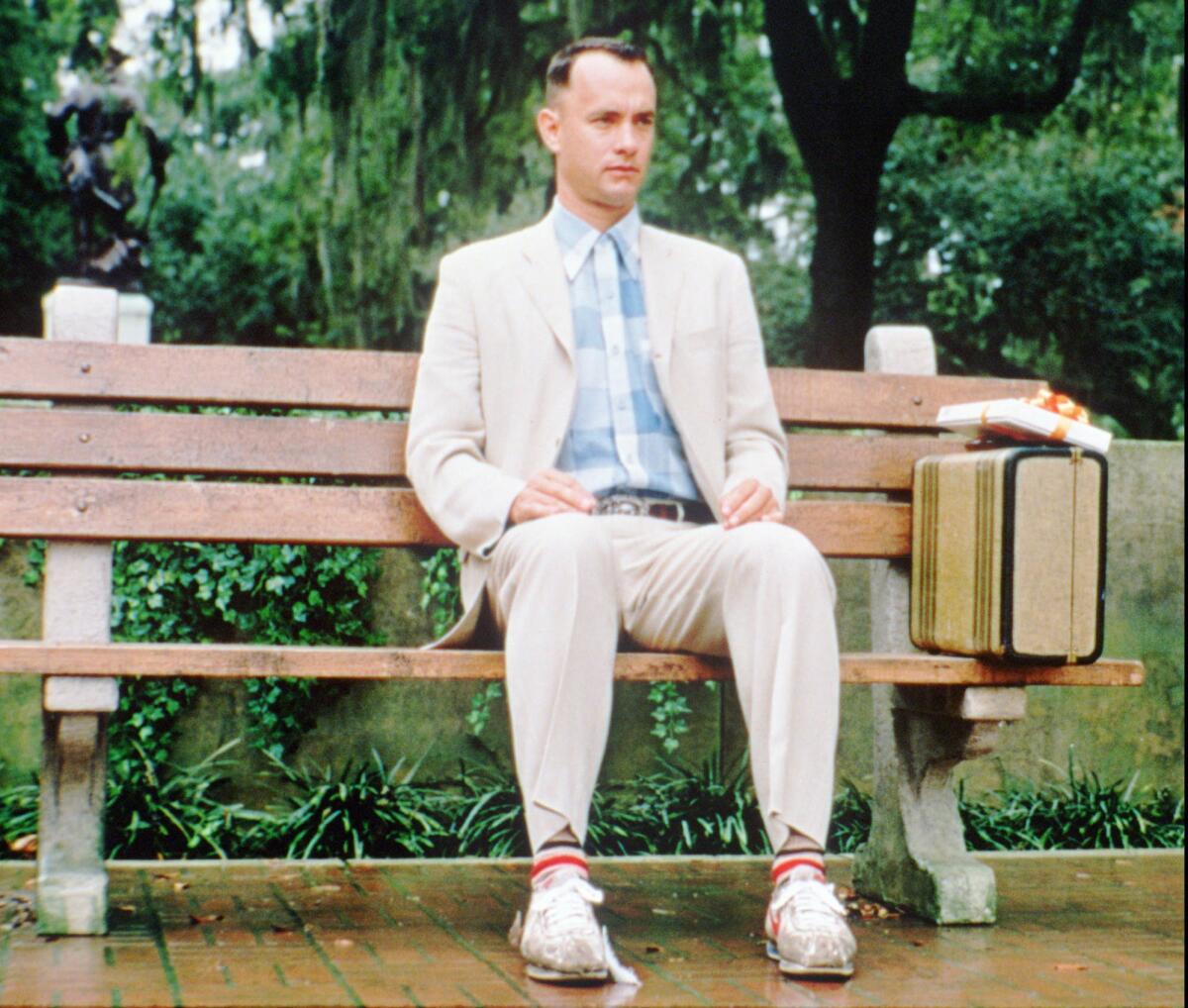Column: Let’s get rid of the term ‘everyman,’ especially when referring to Tom Hanks

- Share via
If I hear the term “everyman” one more time, I am going to scream. Loudly, on the street and repeatedly. Naked and with drums, if that is what it takes to kick the term out of the cultural lexicon.
We’ve been hearing it a lot lately, mainly because Tom Hanks has a new movie out and when Tom Hanks has a new movie out, “everyman” is everywhere. It is the go-to description of Hanks, just exactly as if he were not an actor, a fine and versatile actor, which means he can, and indeed has, played every sort of man. Or person (insert “Bosom Buddies” reference here and then quietly draw a veil over a conceit once considered funny and now not so much).
In the movie he has out this weekend, Hanks is playing Mister Rogers in “A Beautiful Day in the Neighborhood,” so, as you can imagine, the “everyman” usage has hit DEFCON 1. Prepare the warheads.
This is not to diss anyone who has used the term lately or even frequently. I have used it myself, probably at least once to describe the mien of Tom Hanks. But there was something about the term in reference to a film about Mister Rogers that sent me over the edge — Fred Rogers is an “everyman” like Tom Hanks is an “everyman,” which is to say not at all.
According to Webster’s, “everyman” is “the typical or ordinary person.” We can pause right there to note that the term is obviously and exclusively male and has no feminine counterpart, because, apparently, when we are describing “the typical or ordinary person” we mean a man even though the majority of people living on this planet are women. “Everywoman” is not a description regularly associated with any female actor, including Sally Field; historically, the term “girl next door” signified a similar down-to-earth charm (though never in a leading role), but mercifully it has fallen out of favor.
“Everyman” is mostly used as a literary term, introduced into the language by a 15th century morality play written in Middle English. In it, according to the British Library website (in case you thought I could actually read Middle English), a character known as Everyman is informed of his imminent death, by Death himself. He quickly struggles to put aside all the false and worldly things he loves to achieve the Christian version of salvation.
So it is not surprising that the modern version of “everyman,” while not overtly Christian, is rarely, if ever, applied to any person or character identifying with any other faith. Or to a man who is not white. Tom Hanks is many things including highly Caucasian, which is one big reason why the constant reference to him as an “everyman” is so very troublesome.
An “everyman” is also rarely to never plagued by addiction, mental illness, irrevocable physical challenges or even, with the exception of, say, “The Grapes of Wrath,” extreme poverty. Today’s “everyman” is either working or middle class, even though both of those things are vanishing at a rapid clip.
The biggest problem with the term, however, especially as it is applied to Hanks, is not demographic but spiritual. Any actor who can embody Walt Disney, Fred Rogers and Forrest Gump cannot be said to specialize in “everyman.” Hanks has certainly played characters that fit with the traditional imperfect-but-struggling-toward-grace definition of the term — Joe Fox in “You’ve Got Mail,” Charlie Wilson in “Charlie Wilson’s War,” even Ben Bradlee in “The Post.” More often than not, however, his characters are essentially decent and kind men who, when placed in extraordinary circumstances, do extraordinary things. Captain Miller in “Saving Private Ryan,” Viktor Navorski in “The Terminal,” Richard Phillips in “Captain Phillips,” James Donovan in “Bridge of Spies,” Chesley Sullenberger in “Sully” and, of course, Woody in the “Toy Story” franchise.

Woody, like many of Hanks’ characters, makes mistakes, sure, but his resting point is nice. Not just nice, benevolent. A leader, who is often willing to sacrifice himself for the group.
That is what Hanks is so good at, and why we love him so — his characters inevitably seem soft around the edges (at 63, Hanks could still be described as baby-faced) but time and again they prove that kindness is strength, quiet resolve is the best form of courage and moral decency is the bedrock of heroism.
Wouldn’t it be nice to live in a world where that was the definition of typical and ordinary, of “everyman”? Alas, we will probably never know. For many of us, the struggle begins much further back on the path to salvation; for many of us, “everyman” characters are very far removed — by color, gender, culture, mental health or financial and emotional security, never mind essential goodness — from any recognizable definition of “ordinary” or “typical.”
Hanks is an extraordinary actor who most often plays heroes. Not super- or anti- or gimlet-eyed classic but heroic nonetheless. There’s nothing “everyman” about it, and why should there be? The term is, at best, meaningless and, at worst, dismissive. Being kind and decent takes work, sometimes hard work, in real life and on the big screen, and many of us face obstacles beyond moral fortitude.
And as good an actor as Hanks is , no one should be asked to carry the burden of every man.
More to Read
The biggest entertainment stories
Get our big stories about Hollywood, film, television, music, arts, culture and more right in your inbox as soon as they publish.
You may occasionally receive promotional content from the Los Angeles Times.











